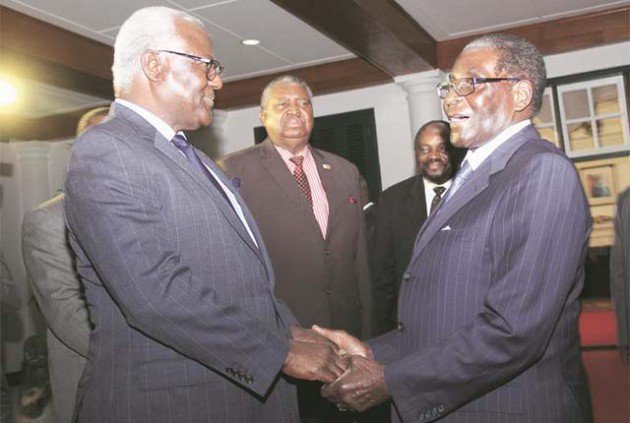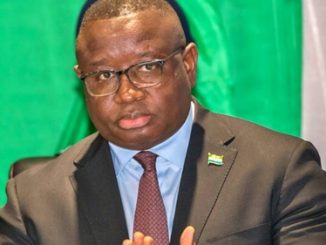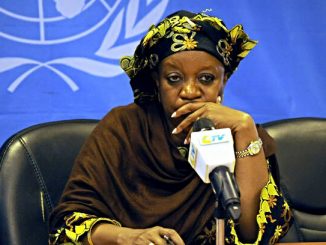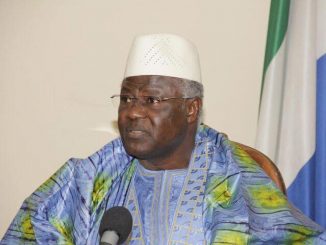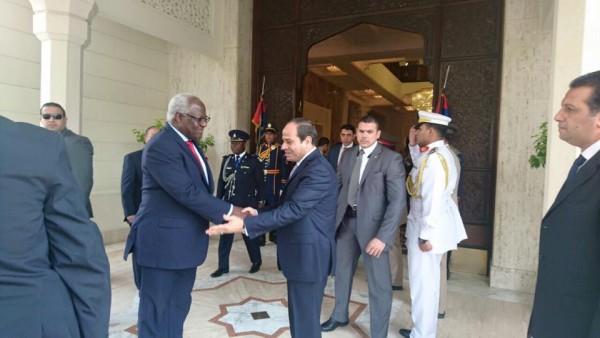
By KABS KANU
President Ernest Koroma has been out of Sierra Leone whole week as international duty summoned.
As Chair of the African Union Committee of 10 (C-10), tasked with the responsibility to canvas and promote support for the African Common Position in the United Nations Security Council Reform negotiations, the Sierra Leonean Head of State has been on a three-nation African tour to help accelerate not only an early reform of the Council, but ensure that Africa achieves its goals , set out in the Ezulwini Consensus and the Sirte Declaration.
According to the Ezulwini Consensus , reached by African heads of states at Ezulwini, Swaziland in 2005, Africa is demanding two seats in the Permanent Category of the UN Security Council, three seats in the Non-Permanent Category and use of the Veto.
President Koroma has been visiting Chad, Egypt and Zimbabwe to hold consultations with his peers with regards to pushing forward the process of the reform of the UN Security Council.
PRESIDENT KOROMA MEETS ZIMBABWEAN PRESIDENT ROBERT MUGABE DURING HIS MINI-AFRICAN TOUR ON BEHALF OF WORLD PEACE AND SECURITY : CREDIT -ZIMBABWEAN NEWSPAPERS
For the public to understand what the process is all about , the importance of President Koroma’s mini-African trip and the rationale of the African Common Position, I will give a brief background of the Reform negotiations.
The UN Security Council, it must be noted , is the principal organ responsible for the maintenance of international peace and security.
PRESIDENT KOROMA MEETS EGYPTIAN PRESIDENT Abdel Fattah el-Sisi : CREDIT -ALHAJI JALLOH
The Security Council , as it is presently constituted, is not representative of the geopolitical realities of the modern world and its present modus operandi reflect a bygone era. The paradigm of international relations has changed significantly since 1945 when the UN was set up, after the Second World War, and when the countries that won the war put together a Charter that promoted only their own interests, leaving the working methods of the Security Council inconsistent with the present realities of the world. There are 5 permanent members of the Security Council called the P-5 : The U.S, Britain, China, Russia and France. These 5 nations are perceived to be the only ones that actually determine the destiny of the world because they enjoy more prerogatives and power than others and wield the power of the Veto through which they can prevent the adoption of any draft resolutions, no matter the weight of overall international support and preference of the resolution or action. The Security Council has ten non-permanent members elected for two-year terms by the General Assembly (with end of term date):
For Africa, this is always unacceptable because about 75% of the matters that come to the Security Council for consideration and action concern African problems . More or less, Africa has no say in the matters that concern her own peace, security and well-being. Other geopolitical members who have no permanent representative in the Council feel the same .
Reforming the UN and especially the Security Council, has therefore became the focus of global attention since the 1990s, as a matter of fact .
Thus, at the 2005 World Summit, world leaders called resolutely for the early reform of the Security Council as an essential element in the overall effort to reform the United Nations.
PRESIDENT KOROMA HOLDING CONSULTATIONS WITH THE PRESIDENT OF CHAD IDRISS DEBY : CREDIT -ABDULAI BAYRAYTAY
However, the intergovernmental negotiations among member states, which I have been privileged to be attending since my appointment as Coordinator of C-10 in New York, has been slow and elusive due to what some member states perceive as “the multiple and competing proposals ” by various groups like the P-5, African Group, G-4, Uniting for Consensus, L-69 , S-5, etc.
During intergovernmental negotiations, Sierra Leone, on behalf of the African Group, and members of the group , have cried out against what they refer to as the “historic injustice” done to Africa by being denied permanent membership and use of the veto, despite her growing geopolitical and economic influence and importance and they have been calling unequivocally for the expansion of the Security Council to include at least two permanent seats for Africa with all the rights and obligations of current members, including the veto, and two additional non-permanent seats.
Reforming the UN Security Council is therefore a very important exercise that will change the dynamism of the United Nations as a whole with respect to its working methods and the influence Africa will have on decisions affecting the peace and security of the world.
This underlines the importance and significance of President Koroma’s position as Chair of C-10 and his world and African shuttles on behalf of the continent and the world in general. It is an exercise that will leave indelible footprints in the sands of history and the President and his teams at the Permanent Missions of Sierra Leone to the UN in New York and the AU in Addis Ababa have already won for themselves an enviable place in history as there is no way that President Koroma’s name will not be mentioned whenever the story of the UN Security Council Reform is being written.
For Africa , having a voice , influence and power in the UN by being represented in the Permanent Category of the Security Council and having use of the Veto will be an ultimate achievement because through that the continent will be able to influence decisions that will impact on its economy, peace , safety and security.
Sierra Leoneans should exude a sense of pride at this very important role their President and nation are playing in helping to make the world a safer and more secured place for everybody in the world and future generations.
I WILL BRING YOU MORE WRITE-UPS ON THE UN SECURITY COUNCIL REFORM.

